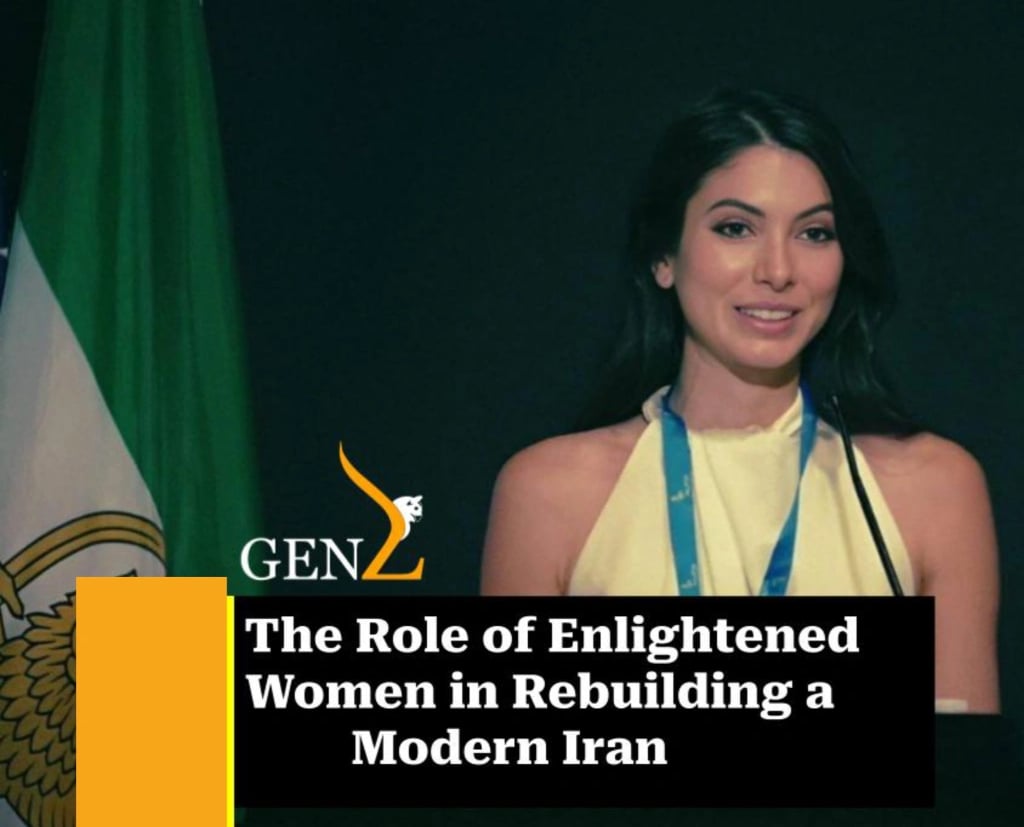The Role of Enlightened Women in Rebuilding a Modern Iran
Many people ask: “What will happen to the Iranian people after the Islamic Republic?” To answer this question, we must first reflect on the time before this dark shadow fell upon our homeland. Then, considering present-day events and developments, we will explore the evidence to envision and build a new Iran. Shahbanou Farah Pahlavi and…
8/25/20253 min read


Many people ask: “What will happen to the Iranian people after the Islamic Republic?”
To answer this question, we must first reflect on the time before this dark shadow fell upon our homeland. Then, considering present-day events and developments, we will explore the evidence to envision and build a new Iran.
Shahbanou Farah Pahlavi and Princess Ashraf Pahlavi devoted their full energy to improving and advancing the lives of the Iranian people. Through bold, positive, and often taboo-breaking initiatives—especially in a time when patriarchy dominated society—they played a vital role in women’s social development and cultural empowerment in Iran.
In the 1940s, Princess Ashraf Pahlavi, alongside Mohammad Reza Shah Pahlavi, established the Imperial Organization for Social Services. Under her leadership, it significantly contributed to improving the lives of vulnerable populations, particularly in rural areas and urban slums.
In 1949, she also founded the Princess Ashraf Pahlavi Nursing School, which trained and graduated 1,260 nurses over a three-year program to serve in hospitals across the country.
She was also active in the field of women’s rights. In 1965, through the National Committee for the World Literacy Campaign under UNESCO’s supervision, she helped transform literacy efforts into a sustainable, non-formal education movement in Iran.
As Chair of the UN Commission on Human Rights and the UN Commission on the Status of Women, she played a key role in international diplomacy, including helping facilitate the withdrawal of Stalin’s Red Army from Azerbaijan. She later founded the Foundation for Iranian Studies to promote awareness of Iran’s true history and cultural heritage at home and abroad.
Shahbanou Farah Pahlavi, for her part, made major contributions to cultural development and women’s welfare. She founded the Institute for the Intellectual Development of Children and Young Adults, the Tehran Museum of Contemporary Art, and sponsored major art festivals. Through the Farah Pahlavi Foundation, she supported educational and healthcare initiatives that uplifted the lives of rural women and children. She also worked to reform family law, expanding women’s rights in divorce and child custody, and helped increase women’s presence in various sectors of society.
At last, after so many long and dark years for Iranians, particularly Iranian women, Princess Noor Pahlavi emerges as a strong, principled, and moral voice. In the tradition of the active and patriotic women of her dynasty, she remains firm in standing up for human dignity, women’s rights, and equal access to medical treatment.
Holding a Bachelor’s degree in Psychology and a Master’s degree in Business from two top-tier American universities—and having worked for years in major American corporations—she is now stepping forward with a fresh perspective, aiming to help improve the current healthcare conditions in Iran.
Princess Noor not only has a strategy of performance, but she has one that is practical, well-grounded in her writings, experiences, and a profound sense of duty. She has written about women’s health, child labour, challenges facing Iranian society, and has repeatedly drawn attention to the humanitarian cost of the regime’s neglect.
By many accounts, her latest speech at the Iranian Prosperity Project (IPP) launch, held by National Union for Democracy in Iran (NUFDI) in Washington, DC, was the culmination of a years-long dedication to genuine service. In her speech at the IPP launch, Princess Noor described Iran’s crisis as not political or economic, but human. She pointed out that Iranian families today are confronted with impossible choices—having to choose regularly between placing food on the table and getting medicine for their children. The average Iranian household spends nearly 40% of its expenses on healthcare alone, one of the highest in the Middle East. Despite these costly measures, citizens receive almost nothing in return.
Her perspective is not theoretical. With her background in American health care and genuine affection for her native homeland, she addresses the topic with expertise and compassion. Long before this conference, she authored several articles in outlets like Independent Persian and Kayhan London, urging action and offering her insight. Her involvement in the IPP isn’t a photo-op but a continuation of a years-long commitment to this cause.
She is not just a descendant of the Pahlavi dynasty — she is a face of the new Iranian generation. A generation shaped by activism, forced exile, vision, and hope. A generation defined by an intense sense of patriotism, determination, and its thirst for freedom. Her voice is not unfamiliar or foreign—it belongs to Iranians. And her example shows us that dignity, compassion, and national responsibility are not relics of the past, but urgent necessities for the future.
But perhaps what makes Princess Noor especially powerful as a public figure is what she represents. In a country where women have been systematically marginalized for almost five decades, Princess Noor’s presence on the IPP stage was not only symbolic but a reflection of what is possible. A free and democratic Iran will need capable, thoughtful, and caring leaders. And as we look ahead to rebuilding our country, it’s clear that women like her must help lead the way.
